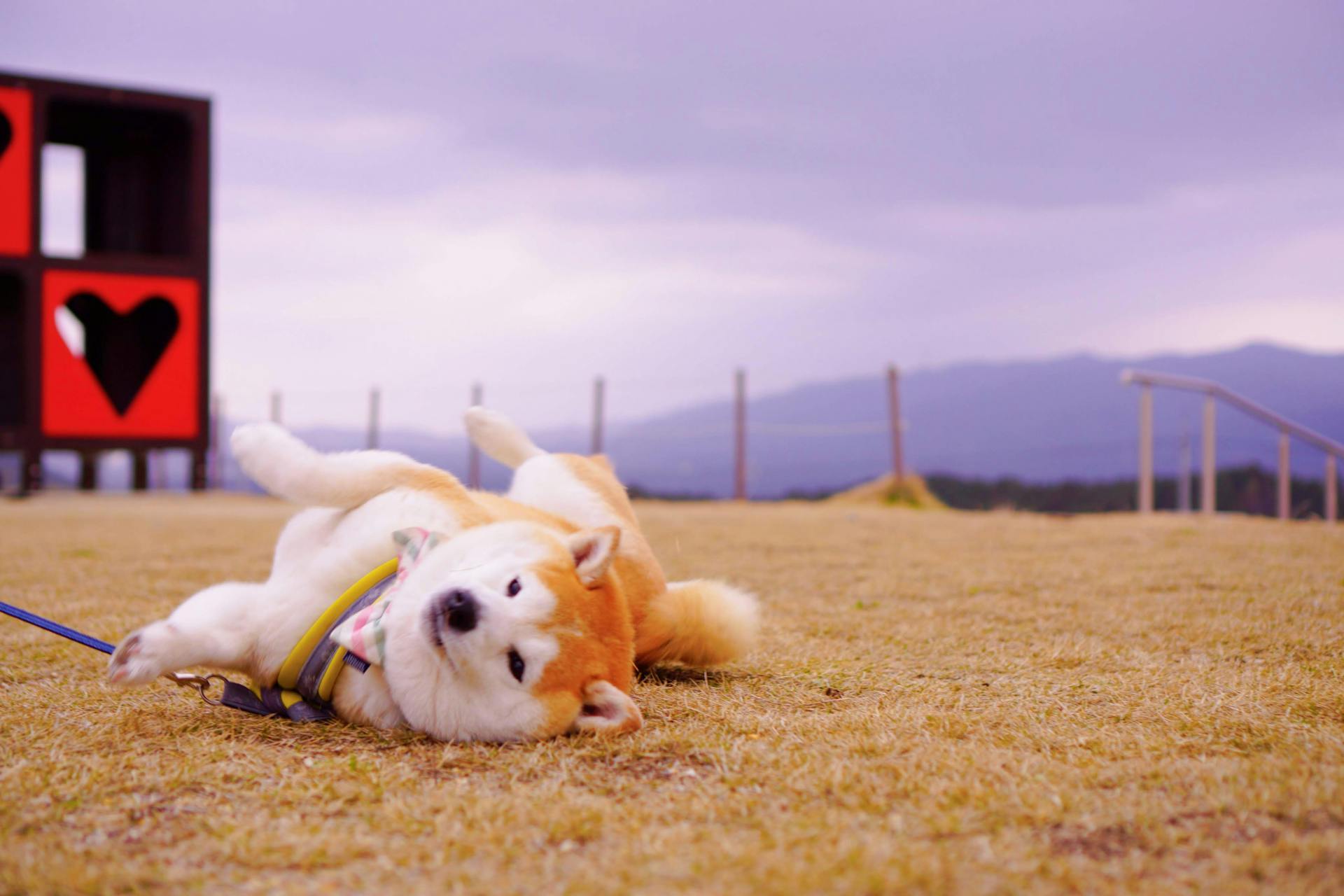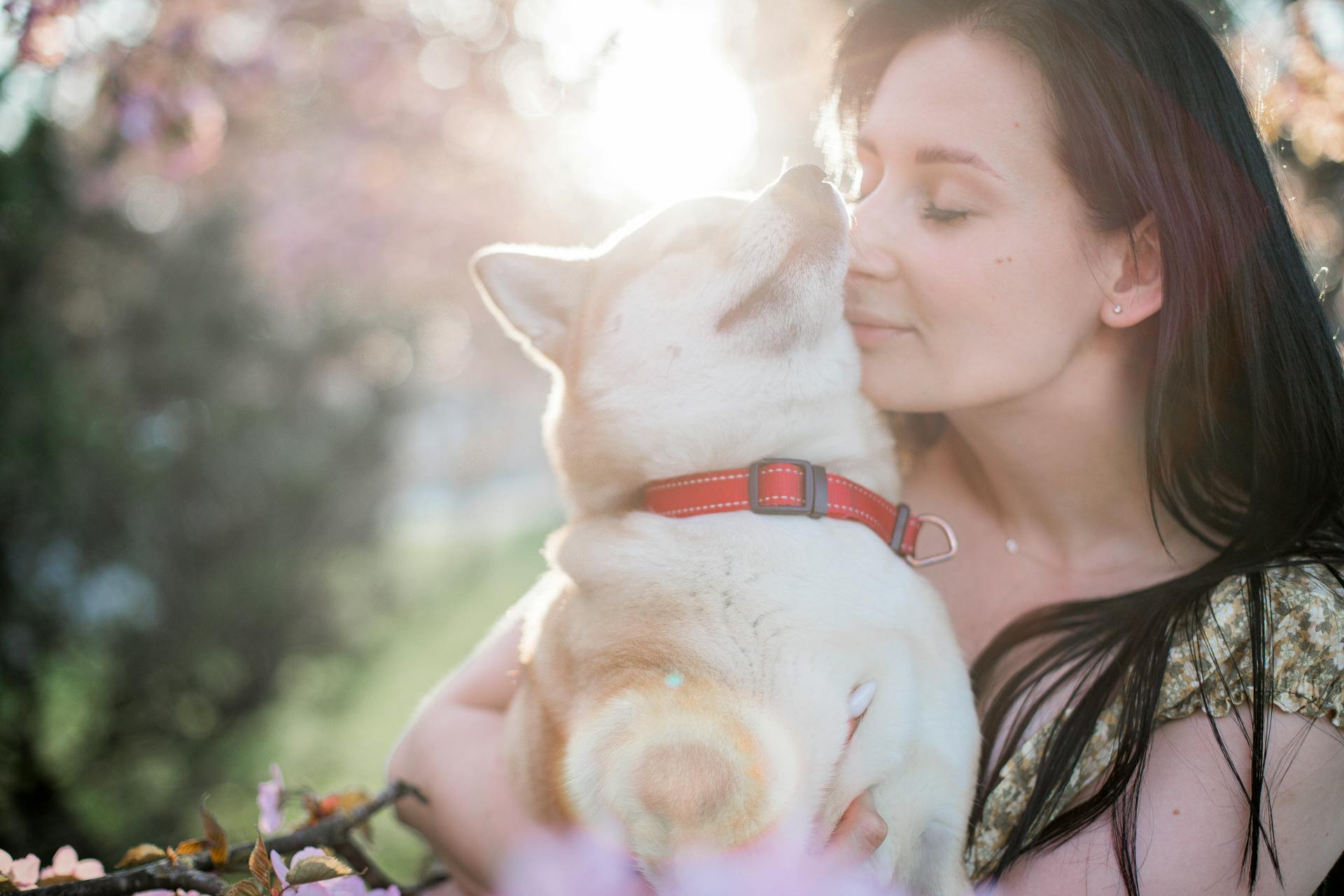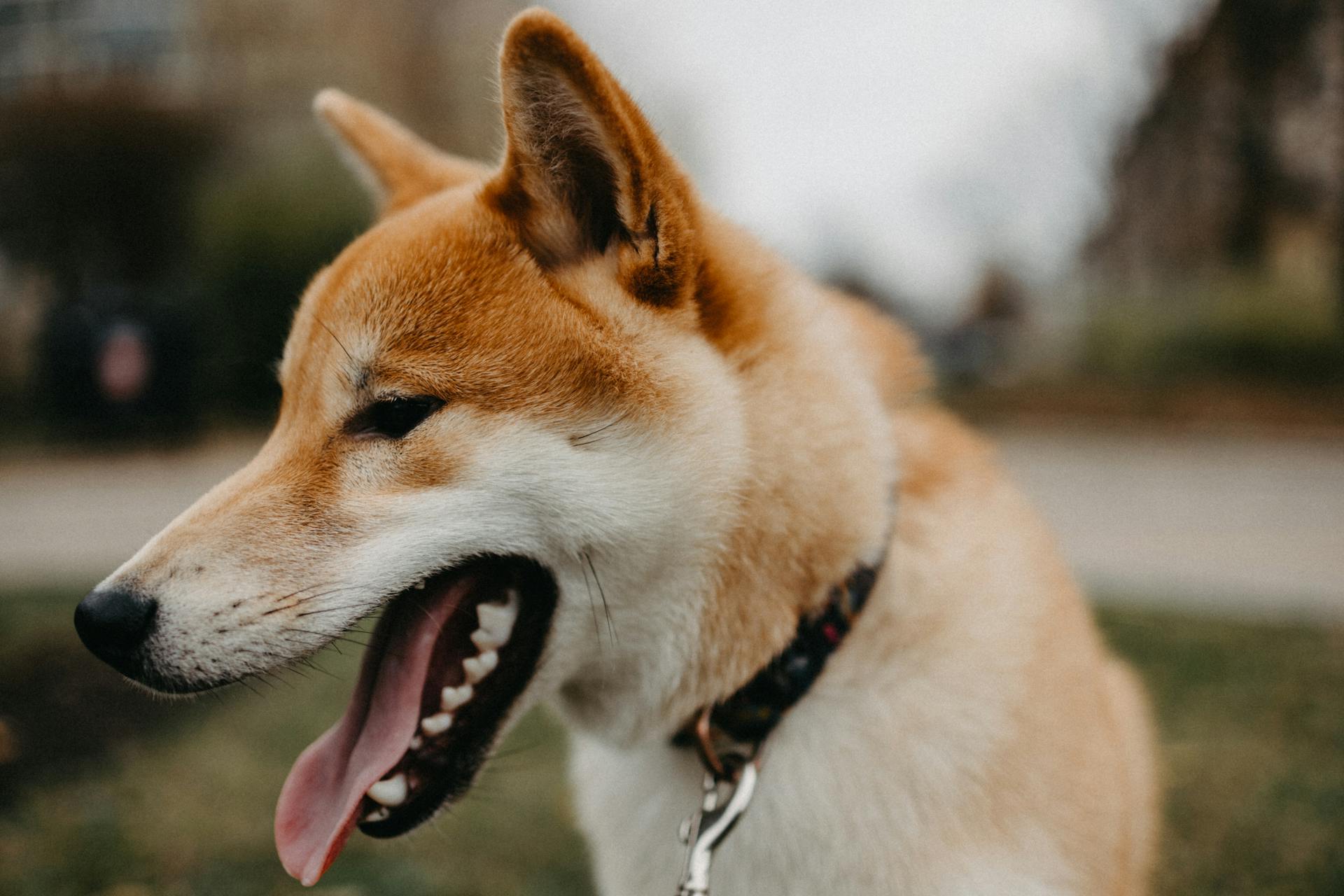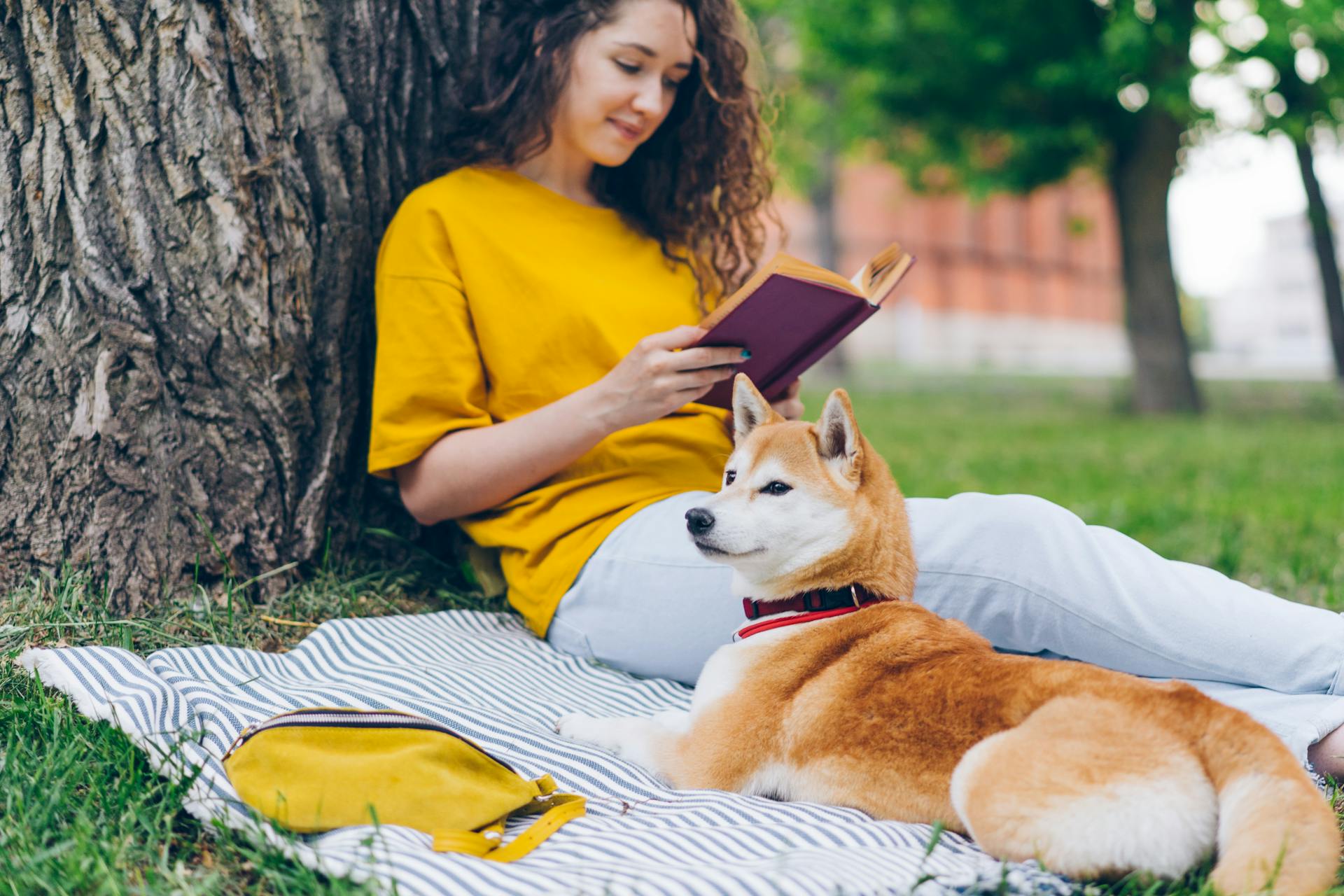
Shiba Inus are known for their unique and playful personalities, but their lives are divided into distinct stages, each with its own set of characteristics and needs.
From puppyhood to adulthood, Shiba Inus go through a series of physical and behavioral changes that are shaped by their breed, genetics, and environment.
As a puppy, a Shiba Inu's eyes change from blue to brown between 4 to 14 weeks old, a process that's influenced by the amount of melanin present in their eyes.
Shiba Inus typically reach physical maturity between 1 to 2 years old, at which point they're considered adults.
Intriguing read: Shiba Inu Eyes
Physical Characteristics
As a Shiba Inu owner, you'll notice their physical characteristics change significantly throughout their life stages.
Their adult weight can range from 15 to 25 pounds, depending on their lineage and overall health.
Shiba Inus typically reach their full height between 6 to 9 months old, with males growing up to 14.5 inches tall and females up to 13.5 inches tall.
Their distinctive fox-like face and triangular ears are noticeable from an early age, but their adult coat develops around 6 months old, featuring a double layer of fur with a soft undercoat and a harsh outer coat.
For another approach, see: 4 Month Old Shiba Inu
Personality & Temperament
Your Shiba Inu's temperament will be based on training, socialization, and its heredity.
A Shiba puppy with a nice temperament will display curiosity and a willingness to approach others or be held. It's essential to choose a pup that's middle-of-the-road, not overly aggressive or timid.
To get a better idea of what to expect as your dog gets older, ask about the puppy's parents. This will give you insight into their temperament and behavior.
Exposing your Shiba Inu puppy to various experiences, sounds, sights, and people during puppy socialization training is crucial. This will help polish his social skills at a young age, making him a joy to own as a companion dog.
A different take: Shiba Inu Hard to Train
Intelligence
Shiba Inus are known for their high intelligence, which can make them both a joy and a challenge to have as pets. They are quick learners, capable of picking up new commands and tricks with ease, especially when motivated with treats or toys.
Their intelligence also allows them to solve problems on their own, such as opening doors or escaping enclosures, which can sometimes be a problem for owners who want to keep them safe. Shiba Inus are individualists and may ignore commands if they don't see the point of following them.
To train a Shiba Inu, it's essential to use positive reinforcement techniques, such as rewards, praises, and playtime. Consistency is also key, as Shiba Inus can be stubborn and require early and consistent training to set clear limits and rules.
Socialization is crucial for Shiba Inus, especially in their early stages, to help them become well-adjusted adults. Exposing them to different people, animals, and situations can help overcome their natural hesitance towards strangers and potential aggressiveness.
To keep your Shiba Inu engaged and prevent boredom, it's vital to provide mental stimulation through activities like puzzle toys, games, and regular training sessions. This will help prevent destructive behavior and strengthen your bond with your dog.
Here are some key characteristics of Shiba Inu intelligence:
- Quick learners: They pick up new commands and tricks easily.
- Problem-solvers: They can open doors or escape enclosures.
- Stubborn at times: They may ignore commands if they don't see the point.
- Respond to positive reinforcement: Rewards, praises, and playtime work well.
- Require consistency: Early and consistent training is essential.
- Need socialization: Exposure to different people, animals, and situations is crucial.
- Need mental stimulation: Puzzle toys, games, and regular training sessions prevent boredom.
Health and Care
As your Shiba Inu grows and ages, their health needs will change. Regular veterinary check-ups can help catch health issues early, when they're most treatable. This is especially important for Shiba Inus, who may be prone to certain health problems.
Proper nutrition is essential for your Shiba Inu's overall health. A balanced diet suitable for their age, size, and activity level can help prevent health issues. This means feeding senior-specific dog food as your Shiba Inu ages.
Exercise is also crucial for maintaining a healthy weight and supporting joint and heart health. Regular, moderate exercise can help prevent stress and anxiety, which can impact physical health. This means shorter, more frequent walks for older Shiba Inus.
Shiba Inus are prone to bone and joint problems, such as patellar luxation and hip dysplasia. These conditions can be diagnosed and treated to prevent undue pain and suffering. Regular veterinary check-ups and X-rays can help identify issues early.
You might enjoy: Shiba Inu Diseases
Here are some common health concerns and prevention strategies for Shiba Inus:
- Regular vet visits: Routine check-ups can help catch health issues early.
- Proper nutrition: A balanced diet supports overall health.
- Exercise: Regular, moderate exercise helps maintain a healthy weight and supports joint and heart health.
- Mental stimulation: Keeping your Shiba Inu mentally engaged can prevent stress and anxiety.
By being proactive about your Shiba Inu's health, you can help ensure they lead a long, happy, and healthy life.
Dog Weight Management
Dog Weight Management is crucial for Shiba Inus, as it affects their overall health and well-being. A balanced diet is essential to maintain a healthy weight.
You should be able to feel your Shiba Inu's ribs without seeing them, which means they are at a healthy weight. If you can't feel the ribs, it's time to give them more exercise and reduce their food intake.
Shiba Inus can be prone to obesity, so it's essential to monitor their weight regularly. Feeding them raw dog food recipes or high-quality dog food with lean protein sources can help maintain a healthy weight.
Use a puzzle bowl to slow down your Shiba Inu's eating time, especially if they're fast eaters. This can help prevent overeating and maintain a healthy weight.
If this caught your attention, see: A Guide to Managing Healthy Weight in Your Dog This Summer
Here are some general guidelines for maintaining a healthy weight in Shiba Inus:
Regular veterinary check-ups can also help manage age-related health issues, including weight gain, in older Shiba Inus.
Life Stages
Shiba Inus go through a significant growth spurt between three to seven months of age, during which they nearly double in size.
This period of intense growth is a normal part of a Shiba Inu's development, and it's essential to provide them with a balanced diet and plenty of exercise to support their growth.
Shiba Inus typically reach their full size by 12 months old, although larger dogs may take up to 18 months to fill out.
A fresh viewpoint: Shiba Inu Growth Chart
At What Age Is a Dog Fully Grown?
Shiba Inus have intense growth spurts between three to seven months of age, during which they nearly double in size.
Most Shiba Inus will be considered full-grown by 12 months old in terms of their height and weight.
Larger dogs may take up to 18 months to fill out and reach their full size.
At six months old, most Shiba Inus will weigh between 12 and 17 pounds.
Females tend to fall on the smaller side of that weight range.
By one year of age, Shiba Inus will have reached their full size, but it's essential to remember that every dog is different.
Broaden your view: Shiba Inu Size Comparison to Human
Aging Signs
As your Shiba Inu ages, you may notice some changes in their behavior and physical appearance. Graying around the muzzle and face is a common sign of aging in Shiba Inus.
Their energy levels may decrease, making long walks or playtime less appealing. Decrease in vision or hearing is another sign of aging that you might observe.
Age-related health issues like arthritis can affect their mobility, making it harder for them to move around comfortably. Changes in sleep patterns or behavior are also common as they age.
Here are some specific signs of aging to look out for in your Shiba Inu:
- Graying around the muzzle and face.
- Decrease in vision or hearing.
- Development of age-related health issues like arthritis, which may affect mobility.
- Changes in sleep patterns or behavior.
Neonatal (0-12 days)
The neonatal period is a critical time for Shiba Inu puppies, starting immediately after birth and lasting up to 12 days old.
During this time, your puppy cannot yet see, but they've already begun the learning process.
Their mother and littermates are their main source of comfort and security, so it's essential to provide a clean, warm, and comfy area for them at all times.
The mother's well-being is crucial, so make sure she's fed well, unstressed, and comfortable.
Even the smallest stimulus, like handling and noises, can influence the puppy's learning and coping mechanisms, so begin handling the puppy to stimulate learning and get them used to human handling and sound.
This is also a good time to introduce a few squeaky toys to the puppy and encourage them to engage with various toys.
Recommended read: First Time Boarding My Dog
Life Stages Varies 5-12 Months
Between 5 to 12 months, your Shiba Inu puppy will go through a second fear impact period, where they develop new fears due to their continued physiological changes and awareness of their surroundings.
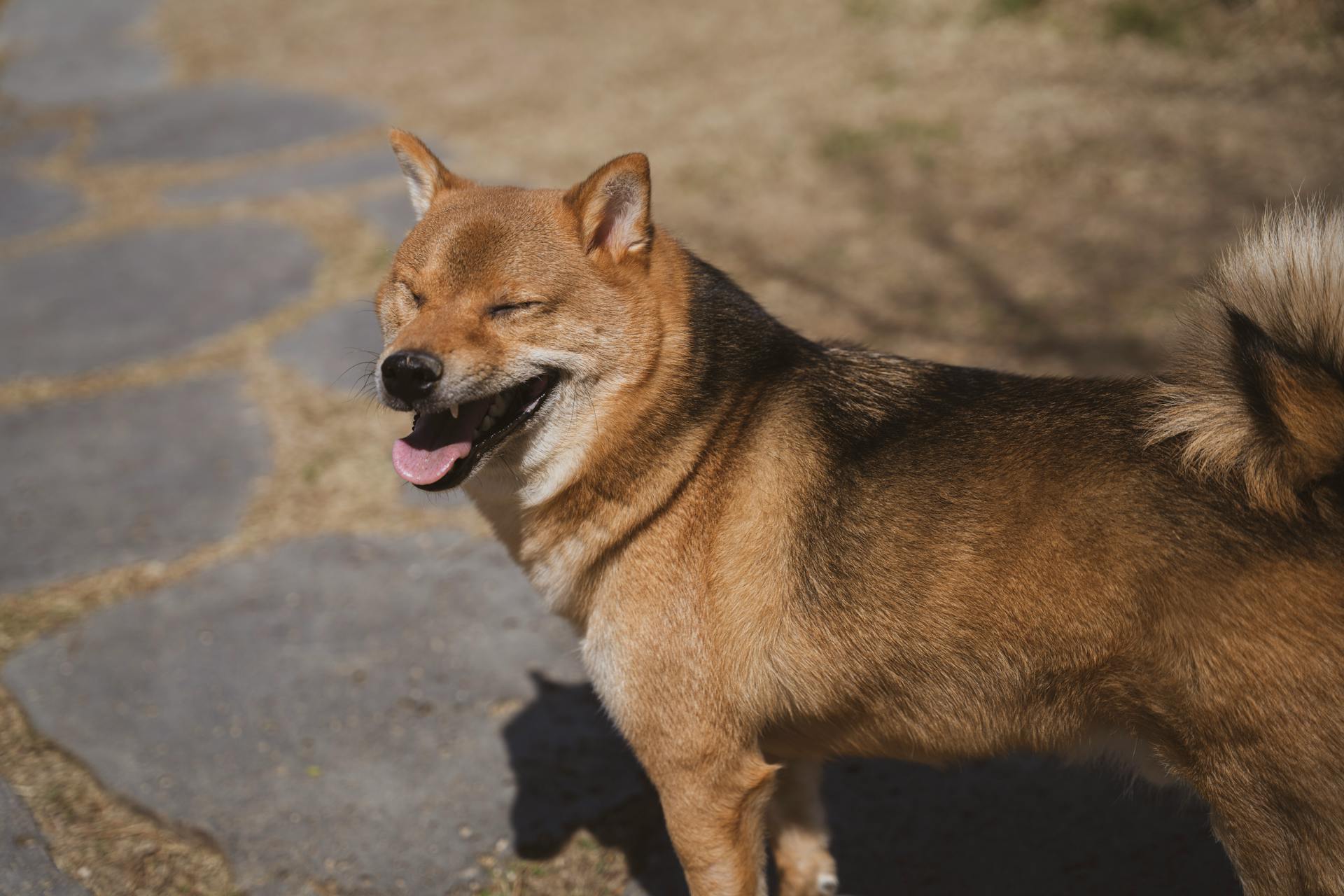
This period usually lasts around three weeks and can be a challenging time for puppies and their owners. Not all dogs go through this experience, but if they do, it's essential to be patient and not force them to confront their fears head-on.
Gradually work with your puppy to build confidence and reassurance, and make sure to provide a safe and stable environment for them to grow and develop.
Shiba Inu puppies typically stop relying on their mother's help to urinate and defecate between 13 to 20 days old, and they start to develop their physical skills, such as walking and wobbling.
During this period, it's crucial to continue exposing your puppy to various stimuli, like noises and handling, to encourage learning and socialization.
As your puppy grows and develops, you'll notice significant changes, such as the start of adult teeth coming in and increased energy levels.
Care and Management
As your Shiba Inu ages, it's essential to adjust their care and management to ensure they remain happy and healthy. Providing a comfortable, orthopedic bed can help alleviate joint pain.
Regular veterinary check-ups are crucial to manage age-related health issues promptly. More frequent visits can help catch health problems early when they are most treatable.
A balanced diet suitable for their age, size, and activity level supports overall health. A senior-specific dog food can help manage weight and provide the nutrients needed for aging bodies.
To maintain mobility without overexertion, shorter, more frequent walks are recommended. Regular, moderate exercise helps maintain a healthy weight and supports joint and heart health.
Do Train?
Do Shiba Inus Train Well?
The Shiba Inu puppy can be quite stubborn when it comes to leash training, making it a necessary but potentially challenging task for owners.
Leash training requires patience and consistency, as Shiba Inus are not fond of being leashed.
Dog obedience training with other dogs is a great way to socialize your Shiba Inu puppy and make training easier.
Housebreaking is relatively easy for Shiba Inus, thanks to their fastidious nature and tendency to go to the same spot each day.
With positive reinforcement and consistent training, your Shiba Inu puppy can learn to go potty in the right spot and avoid accidents in the house.
A fresh viewpoint: Medical Dog Training
Living with a
Living with a Shiba Inu requires patience, consistency, and a positive approach. Socialization is a crucial aspect of their development, helping them become well-adjusted and confident adult dogs.
Shiba Inus are known for their independent nature, which can sometimes translate to intolerance of being handled improperly. Children should be taught how to interact with dogs respectfully and gently.
Early and consistent socialization helps Shiba Inus become more adaptable and patient with the bustling activity levels often found in homes with children. This can be achieved by introducing them to new experiences, people, and environments in a gradual and controlled manner.
Shiba Inus may exhibit same-sex aggression, so proper introductions and understanding dog body language can mitigate potential issues. It's essential to supervise interactions between Shiba Inus and other dogs, especially if they're the same sex.
To ensure a harmonious household, establish clear boundaries and use positive reinforcement training techniques from an early age. This will help manage a Shiba Inu's more stubborn tendencies and foster a loving relationship with their family.
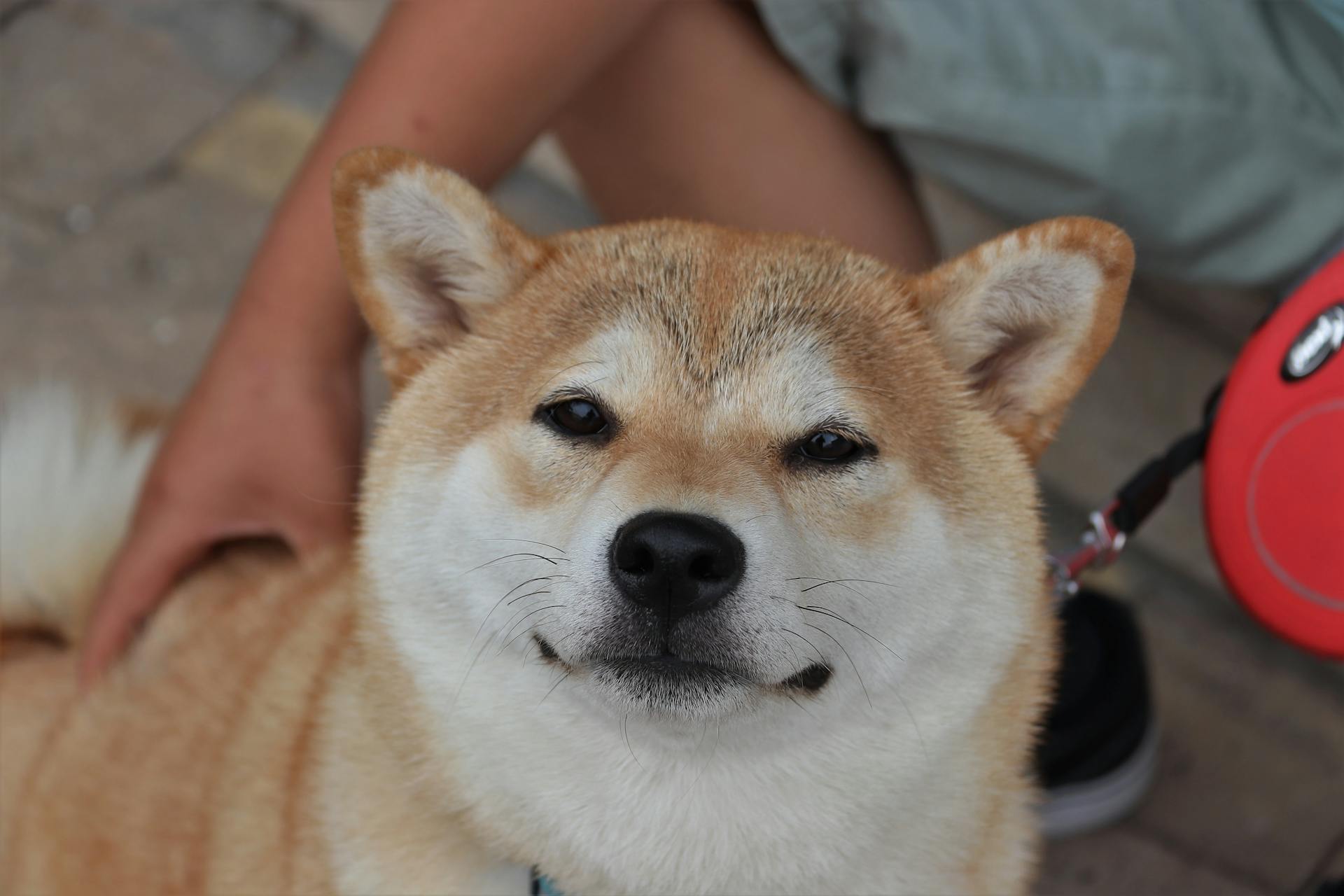
Here are some key socialization strategies to keep in mind:
- Start socialization early, ideally during the puppy stage (between 3 to 14 weeks of age).
- Ensure all socialization experiences are positive, using treats and praise to associate new encounters with good things.
- Gradually introduce your Shiba Inu to a variety of people, animals, environments, and situations.
- Make socialization a consistent part of your Shiba’s routine, with regular exposure to new experiences.
By following these guidelines and being patient, you can help your Shiba Inu become a well-mannered and sociable companion.
Prevention Strategies
Regular vet visits are crucial for catching health issues early when they're most treatable. This can make a big difference in your Shiba Inu's quality of life.
A balanced diet is essential for overall health. A diet suitable for your Shiba Inu's age, size, and activity level can help prevent health problems.
Exercise is also vital for maintaining a healthy weight and supporting joint and heart health. Regular, moderate exercise can make a big difference in your Shiba Inu's physical health.
Mental stimulation is just as important as physical exercise. Keeping your Shiba Inu mentally engaged can prevent stress and anxiety, which can impact their physical health.
Here are some key prevention strategies to keep in mind:
- Regular Vet Visits: Routine check-ups can help catch health issues early when they are most treatable.
- Proper Nutrition: A balanced diet suitable for their age, size, and activity level supports overall health.
- Exercise: Regular, moderate exercise helps maintain a healthy weight and supports joint and heart health.
- Mental Stimulation: Keeping your Shiba Inu mentally engaged can prevent stress and anxiety, which can impact physical health.
Caring for Senior Dogs
Providing a comfortable, orthopedic bed can help alleviate joint pain in senior dogs.
As your furry friend ages, it's essential to make some adjustments to their lifestyle to ensure they stay happy and healthy. Shorter, more frequent walks can help maintain mobility without overexertion.
Senior-specific dog food can help manage weight and provide the nutrients needed for aging bodies. This is especially important if your dog has been eating the same food their whole life.
Regular veterinary check-ups can help manage age-related health issues promptly. I've seen many dogs thrive with proper care and attention.
Here are some key things to consider when caring for your senior dog:
- Comfortable Bedding: Provide an orthopedic bed to alleviate joint pain.
- Diet Adjustments: Feed senior-specific dog food to manage weight and provide necessary nutrients.
- Gentle Exercise: Take shorter, more frequent walks to maintain mobility without overexertion.
- Regular Vet Visits: Schedule more frequent veterinary check-ups to manage age-related health issues.
Caring for Your Pet
Providing a comfortable, orthopedic bed can help alleviate joint pain in your aging Shiba Inu. This simple adjustment can make a big difference in their quality of life.
Regular veterinary check-ups are essential to manage age-related health issues promptly. This will help catch any potential problems early on, when they're most treatable.
A balanced diet suitable for their age, size, and activity level supports overall health in your Shiba Inu. This includes senior-specific dog food that can help manage weight and provide the necessary nutrients.
If this caught your attention, see: Canine Teeth Age Chart
Exercise is crucial for maintaining a healthy weight and supporting joint and heart health in your Shiba Inu. Regular, moderate exercise can be achieved through shorter, more frequent walks.
To ensure your Shiba Inu leads a long, happy, and healthy life, it's essential to be proactive about their health. This includes regular vet visits, proper nutrition, exercise, and mental stimulation.
Here are some key strategies to consider:
- Regular vet visits to catch health issues early
- Proper nutrition to support overall health
- Exercise to maintain a healthy weight and support joint and heart health
- Mental stimulation to prevent stress and anxiety
Spay or Neuter
Spaying or neutering your Shiba is one of the best things you can do for her health and well-being.
This surgery decreases the likelihood of certain types of cancers, such as those that can develop in females.
In females, spaying means surgically removing the ovaries and usually the uterus, which eliminates the possibility of your pet becoming pregnant or fathering unwanted puppies.
Performing this surgery also gives us a chance to identify and address some of the diseases your dog is likely to develop, like hip problems that can be detected with X-rays.
Expand your knowledge: Best Soft Food for Dogs after Dental Surgery
Routine blood testing prior to surgery helps us to identify and take precautions for common problems that increase anesthetic or surgical risk, like certain diseases that can be detected with blood tests.
We'll discuss the specific problems we will be looking for when the time arrives, so you'll know exactly what to expect.
Curious to learn more? Check out: Japanese Chin Dog Health Problems
Average Lifespan and Growth
Shiba Inus have a relatively long lifespan for a dog breed, with an average lifespan of 12-15 years. Genetics play a significant role in their overall health and longevity.
A balanced diet tailored to their life stage can support their health throughout their lives, and regular, moderate exercise helps maintain a healthy weight and supports cardiovascular health. Preventive health care, such as routine vet check-ups and vaccinations, can also prevent or catch early signs of diseases.
Here's a breakdown of a Shiba Inu's growth and weight chart:
Growth Chart
Shiba Inus can look deceivingly large in photos, but their weight and height place them in the small to medium dog breed category.
The growth chart for Shiba Inus is quite predictable, with most puppies following a similar pattern of growth.
Here's a breakdown of the estimated weight and height of Shiba Inus at different ages:
Shiba Inus typically stop growing around one year old, but they may continue to fill out until they're about 2 years old.
Consider reading: Older Shiba Inu
Average Lifespan
The average lifespan of a Shiba Inu is a topic that's on every owner's mind. Dogs have relatively short lifespans compared to humans.
Genetics play a significant role in determining a Shiba Inu's lifespan, with hereditary factors affecting their overall health and longevity.
A balanced diet tailored to their life stage can support their health throughout their lives. A well-planned diet can make all the difference in maintaining a healthy weight and supporting cardiovascular health.
Regular, moderate exercise helps maintain a healthy weight and supports cardiovascular health. This can be as simple as daily walks or playtime in the yard.
Worth a look: Life Expectancy for Shiba Inu
Preventive health care, including routine vet check-ups, vaccinations, and dental care, can prevent or catch early signs of diseases.
Here's a rundown of the factors that influence a Shiba Inu's lifespan:
- Genetics
- Diet
- Exercise
- Preventive Health Care
- Mental Stimulation
While allergies can impact a Shiba Inu's quality of life, they don't necessarily affect their lifespan.
Sources
- https://www.norcalshiba.com/shiba-inu-breed-guide/
- https://myfirstshiba.com/shiba-life-span/
- https://www.pawlicy.com/blog/shiba-inu-growth-and-weight-chart/
- https://myfirstshiba.com/my-very-first-shiba-puppy/shiba-inu-puppy-life-stages-development/
- https://midwayanimal.com/client-resources/breed-info/shiba-inu/
Featured Images: pexels.com
